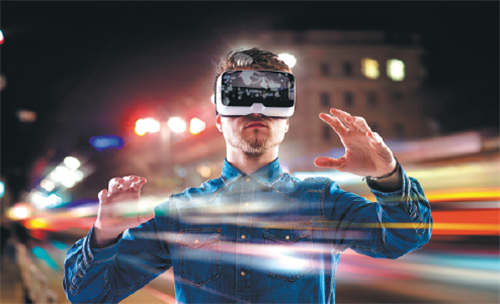The future of VR? US researchers may hold the answer
 |
|
Virtual reality has been hyped for years as the next revolution in computing technology. [Photo/Agencies] |
At the Mall of US' arenasized Smaaash amusement arcade, people wait in line to slip on headsets that resemble blacked-out ski goggles and spend a couple of minutes feeling transported.
They experience the sensations of flying a jet in combat, rescuing a kitten about to fall from a skyscraper or looping in circles on a roller coaster.
Not far away, the mall's Best Buy carries a range of consumer-level virtual-reality equipment. Salespeople explain how VR works, how it feels and how you might make it a part of your home entertainment collection.
For years VR has been hyped as the next revolution in computing technology. Technology giants are investing heavily in its future.
But there's one big obstacle still in the way: It makes large portions of the population-especially women and children-sick.
Motion sickness linked to physical movement has been a fact of life for centuries. But recent years have seen a dramatic increase in physical unease caused by interactive visual technologies. It's caused by the perceptual disconnect as our eyes process vivid images of movement that are out of sync with what our bodies feel.
If VR is ever going to reach its much ballyhooed potential, Minnesota likely will play a major role. Two research projects-one at the University of Minnesota and the other at the Mayo Clinic-are focused on combating VR-induced nausea.
Without such a breakthrough, it's unlikely that masses of people are going to hand over their hard-earned money for VR.
"Why would anyone pay $600 for something that makes you toss your cookies?" asks Thomas Stoffregen, a professor in the University of Minnesota School of Kinesiology who studies how people become spatially disoriented and physically ill by experiencing simulated motion in virtual reality.
Consumers who expect the manufacturers to find a fix are going to have a long wait, he says.
"The companies that are making these are not facing that problem at all. When you buy one of these devices, it comes with an instruction sheet, and down at the bottom of it there's a legal disclaimer that says, 'You may get sick playing this game.'






















